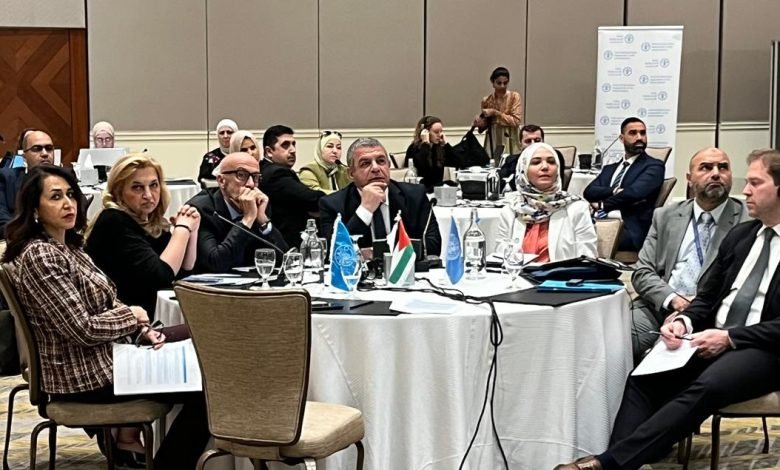
By : JD
Jordan Daily – The Food and Agriculture Organization of the United Nations (FAO) held a workshop on Ecosystem-based Solutions and Utilization of Non-Conventional Water for Agriculture in Amman on April 22, 2024. The workshop aimed to highlight the need for innovative approaches that prioritize efficient water use and promote ecosystem health.
The workshop was part of the FAO project “Nature-based Solutions and Green Infrastructure to address food-water-climate Complexities in Agriculture,” funded by Agriculture and Agrifood Canada (AAFC). It brought together representatives from the government, donors, academia, and non-profit organizations involved in the agriculture sector.
Ecosystem-based Solutions (EbS) are approaches that use natural processes and components to address societal challenges and promote the sustainable and equitable use of natural resources. Harnessing non-conventional water sources, such as treated wastewater and harvested rainwater, can support traditional water sources and alleviate pressure on freshwater reserves.
The Jordanian Government has been investing in projects for greywater reuse in agriculture, using economical, effective, and eco-friendly systems. UN-Water recognized Jordan’s efforts in accelerating progress toward SDG 6 in 2024, assessed across five accelerators: financing, data and information, capacity development, innovation, and governance.
During the workshop, participants discussed strategies for utilizing EbS and non-conventional water sources, identified potential entry points for knowledge exchange, and explored synergies for scaling up initiatives. They also deliberated on various issues that would guide future collaborations among government donors and other partners.
Eng. Raed Abu Soud, Minister of Water and Irrigation in Jordan, stated, “Ecosystem-based Solutions offer numerous benefits for water management in Jordan, including enhancing water availability through natural water retention and recharge mechanisms. It can enhance water availability by restoring natural ecosystems, such as wetlands and forests, which act as natural reservoirs and recharge areas.”
Eng. Nabil Assaf, FAO Representative in Jordan, confirmed that “Ecosystem-based Solutions offer a pathway towards sustainable agriculture and food security in Jordan. By harnessing the power of nature, we can build resilience, conserve natural resources, and ensure the livelihoods of future generations.”
Dr. Jon Marco Church, Technical Expert of UN-Water, shared that “This year Jordan was selected by UN-Water as one of the three countries to be recognized this year for their progress towards the achievement of SDG 6 on water. This is the result of action taken by Jordan for several decades to improve water supply, sanitation, treatment and reuse in a context of extreme water scarcity and population growth.”

